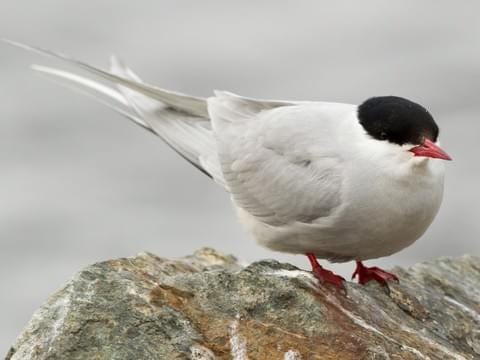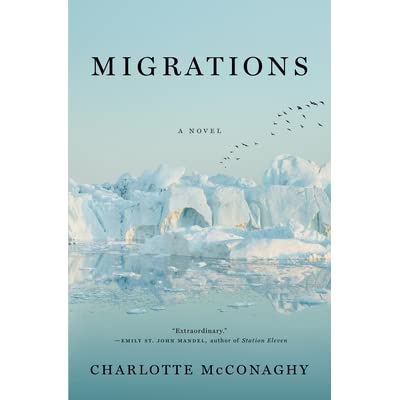I wasn’t exactly sure what I was expecting when I picked up Migrations by Charlotte McConaghy. Birds? Yes. Traveling with their migration? Makes sense. Something to do with love? Yes, I mean, I did read a short description of the book. But the psychological and emotional depth of the book was a little surprising.
I didn’t read any reviews prior to reading the book. If I had, I may have skipped over it. Books that make me have to think and process or focus on philosophical ideas aren’t really my thing. And while this book wasn’t really philosophical, there is some definite exploration of life, of the impact the actions in our lives have on ourselves and those around us, of how the people that come into our lives can change us in profound, unimaginable ways, and that mental health is not a one size fits all concept. It is individualized, meaning it can be misidentified, misunderstood, and even irrational.
There are also the not so subtle environmental issues dealing with global warming and what humans are doing to the planet and the habitats of the animals we share the Earth with. Many animal species have already died out when the story begins, presumably being a subtle job at our current state of indifference when it comes to protecting our environment.
It’s been a while since I’ve read a book where the author was able to create such a dynamic, complex character. Franny Stone-Lynch is a wanderer. She feels that pull that makes it almost an obsession to leave and explore, but she marries Niall impulsively. And I mean impulsively! She yearns to find her mother. She’s a high school dropout who is incredibly smart. She suffers from night terrors and sleepwalking and repressed trauma that causes much of her psychological battles. Unfortunately, she at times is a hard character to like.
“My life has been a migration without a destination.” (Chapter 9)
So how does this fit into following the Arctic Terns' migration from Arctic to Antarctica? Well, it comes in McConaghy’s expertly placed flashbacks that go as far as 18 years. Early on in the book, it’s clear that she is running from something and through the flashbacks you learn she’s been running her whole life from a myriad of issues. Placing trackers on a few Tern’s gives her the means to now chase something tangible.

The chronological story begins with Franny’s desire to secure a spot on a fishing ship. She uses her impressive manipulative skills to finally land herself among an eclectic group of characters on the Saghani captained by Ennis Malone. Each other these characters are developed into their own right into pretty round characters, each harboring their own personal demons and motivations for remaining on a fishing ship, when the oceans are getting more and more depleted of fish every day. The chronological story alone would be a pretty basic story, there are storms Malone must navigate to keep his crew alive, an injury that forces the ship to dock in the midst of protests and, unlucky for the crew, while they are grounded a law is passed prohibiting commercial fishing. This of course leads to illegal sailing and ultimately Ennis and Franny alone on their own migration with the Terns.
“A life’s impact can be measured by what it gives and what it leaves behind, but it can also be measured by what it steals from the world.”
Ennis and Franny form a strong bond through their shared need to prove something to accomplish something. They have a purpose that they have latched on to, and propelled by desperation they continue on through impossible circumstances. It appears at times as if they each know the deep, dark, repressed secrets of the other. Ennis speaks of Point Nemo, the most lonely and isolated spot in the Pacific ocean, as if he relates on a personal level to Franny’s isolated loneliness. Oh, the symbolism! For the record, Point Nemo is a real location. It is the spot on Earth that is farthest away from land:
“Remotest place in the world...Nowhere crueler or lonelier.” (Ennis)
The power of this book comes in the flashbacks, these snapshots of Franny’s past where we as readers begin to learn who she really is and the actions and reactions that have led her to the Saghani in the first place. I have to hand it to McConaghy—it took me a pretty long time to put the pieces together to a point where I was able to begin drawing conclusions on the details that were being left out of the flashbacks. However, I still had enough doubt in those conclusions that I actually found myself longing for another flashback.
Where does this land on my bookshelf?

On the middle shelf, but I debated a while on whether or not I’d put it on the top shelf. My decision came from the knowledge that I will not read this book again. I enjoyed it, was moved by it, and thankful I read it, but it’s not on my ‘to read again’ list. There is an overall tone of loneliness and longing through the entire book. A tug of war between homesickness and exploration. There’s depression, hope, desperation, fear, uncertainty. The read will run the gamut of emotions. One moment blaming Franny for the problems in her life, thinking had she just done x,y, and z this wouldn’t be happening, only to learn something else about her past that makes you guilty for having negative thoughts. There are moments you are heartbroken for her and others where you are questioning.
Read it. You won’t be sorry. I won’t spoil the ending, but once again, I am left with the longing to know what happened to some of the characters. Did Ennis make it home to his kids? Did the only other female on the Saghani die? Did Franny’s mother-in-law condone and support Franny’s mission to follow the birds?
“The truth is a wound I cannot speak.” (Franny)
Just remember the psyche is very complex, and even though Franny is just a fictional character the trauma and coping mechanisms could apply to anyone.
Read Migrations? What are your thoughts?
Read my other book related posts: The Bookshelf
What to talk about real life? Check this out: educate this.
Book Cover photo credit: www.goodreads.com
Arctic Tern photo credit: www.allaboutbirds.com




